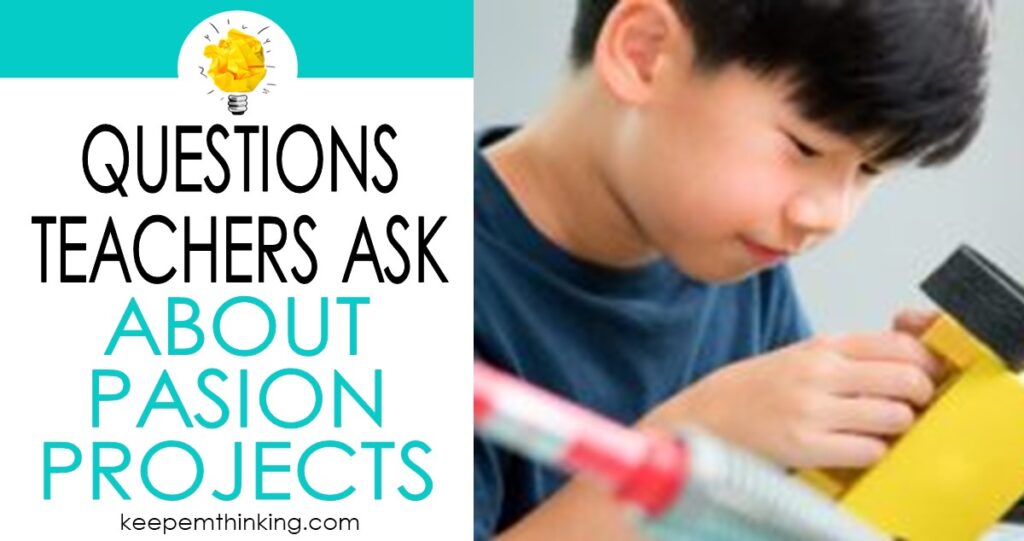
There are so many questions teachers ask about Passion Projects. Passion Projects – just the word is terrifying to many of us. If you’ve never tried them, now is a great time. They are a great end-of-the-year activity. Whenever you try something new, it can be a little frightening. It takes us out of our comfort zone. But, don’t let that stop you! Once you try Passion Projects and see how excited and engaged your students are, you will want to do more and more. If you’ve never done Passion Project, you probably have lots of questions. In this blog post, I will answer some of the more common questions teachers ask about PassIon Projects.
This is my third post in a series about Passion Projects. If you are unfamiliar with this type of project and want to learn more, be sure to check out these two posts. I suggest you start with reading The Power Of Passion Projects In Your Classroom first because it takes you through all the steps.
How long does a Passion Project take from start to finish?
Don’t let the fear that you don’t have time to do Passion Projects hold you back. The length of time you need in your classroom to dedicate to these projects is really up to you. If you only allow students one hour per week to work on their Passion Project, it will probably take twelve weeks. Many teachers spend two to three hours a week on their projects.
How do I find the time for Passion Projects?
Your plate is overflowing with things you have to cover each week, so how do you fit in a Passion Project? I consider Passion Projects as replacement tasks. Look at your schedule and decide if there are any other times in your day or week you could replace with Passion Project time. I know we often assign our students daily worming work. You can easily replace this with Passion Project time. When the kids come into class each day, they can work a little bit on their project rather than completing their typical morning work.
First, you should think of all the skills your students are working on during Passion Projects. For example, are they using skills such as reading, researching, writing, etc? Next, ask yourself if you could use your reading or writing block on a day to devote to Passion Projects.

Can students work in groups?
It is up to you as the teacher to decide if you want to allow students to collaborate on projects. A word of caution: to eliminate conflict, there should be an equal contribution by all students in the group. Because Passion Projects take numerous weeks to complete, students who don’t work well in a group should be discouraged from group work on these projects. Besides, there are other times during the day you can have them work in groups.
What if a student wants to quit or change his project?

Students will usually not want to quit or change if the teacher has been providing feedback throughout the planning stages (selection of topic, burning questions, resources, product, presentation/audience). For this reason, the initial planning stage should not be rushed and is as important as the research and product creation stage. Like all of us, kids sometimes want to rush through the planning stage and get to “creating,” and that is where your role as the teacher comes in.
What if I get a new student after we’ve started our projects?
If your students are in the early stages of the Passion Project process, I suggest working with a new student individually to help him catch up with the others in the class. Undoubtedly you are going to have students who come into the class when Passion Projects are well underway. I suggest you have them spend that time doing exploratory activities centered on areas of interest.
How do you grade the projects?
This is probably the most common question teachers ask me about Passion Projects. Some administrators want teachers to assign a letter grade for anything that is a project, but I prefer to use rubrics. My students are filling out weekly reflections on their Passion Projects, so I use that for feedback.
After the projects are completed and presented, I use the rubric. But, and this is important, I give my kids and their parents a copy of the rubric before we begin the projects.
First, I have the students complete their rubric. Next, we go over it together, and finally, I provide feedback. Some experts suggest only grading or using rubrics for the process, and others suggest evaluating the process, product, and presentation. It is up to you to decide how you wish to assess your students. I assess all three because I feel each component is equally important.
Can students work on Passion Projects at home?

Of all the Passion Project questions I receive, I get this one the most. Some teachers allow students to work on Passion Projects at home. I believe parents can offer suggestions and help supply materials. If you allow students to take their projects home, parents often have too much input.
After years of doing Science Fair Projects and other projects, I have seen far too many that look like the parents did most of the work. When my son was in 3rd grade, one of his assignments was to make a log cabin model. I helped gather materials but made him do the work himself. When I saw all the other students’ projects, I was amazed. Kids whose dads were handy brought log cabin models that were incredible. I told the teacher that she should give the parent an A+. It was obvious that the kid had done none of the construction himself.
Still have any Passion Project questions? Don’t worry. Feel free to email me with any questions you might have. I’m happy to help you out!







